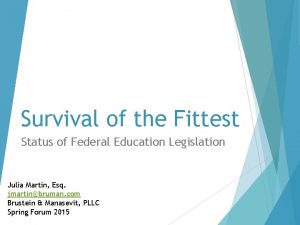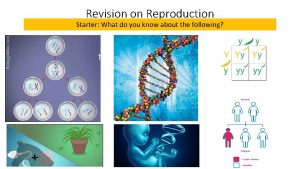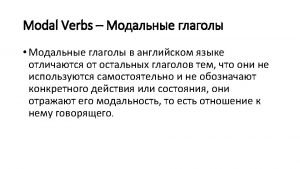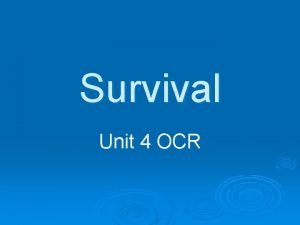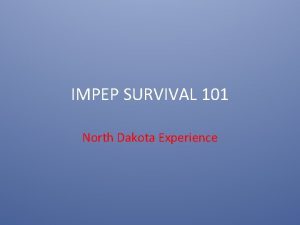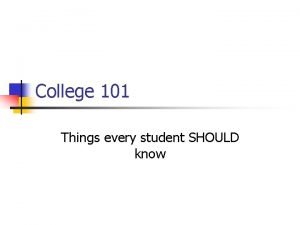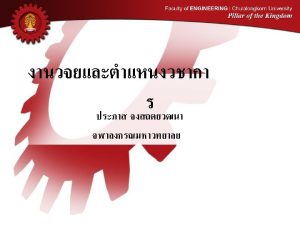101 Words You Should Know for College Survival
















- Slides: 16

101 Words You Should Know for College Survival Terminology

*General: General Education requirements 1. Bachelor’s degree 4. Double major is usually an academic degree earned for an undergraduate course of study or major that in theory, depending on the location and the topic of study, is supposed to last three to five years, but can range more widely in duration, depending on ability and diligence of the student, whether or not the student balances work and other life commitments while attending school, the student's existing level of education, the availability of classes, and school policies an undergraduate student who completes two sets of degree requirements 2. Associate’s degree a degree granted after a two-year course of study, esp. by a community or junior college 3. Post-graduate (graduate) Adj: relating to a course of study undertaken after completing a first degree Noun: a student engaged in a post-graduate course of study 5. Major specialize in (a particular subject) at a college or university 6. Minor study or qualify in as a subsidiary subject at college or university

General, cont. 7. Accreditation 10. Adviser a person who gives advice, typically someone who is expert The goal of accreditation is to ensure that education in a particular field provided by institutions of higher education meets acceptable levels of quality. Accreditation in the United States involves non-governmental entities as 11. Methodology well as governmental agencies. a system of methods used in a particular area of study or activity 8. GA (graduate assistant) a person who serves in a support role (assistantship) at a university, usually while completing post-graduate education 9. TA (teaching assistant) an individual who assists a professor or teacher with instructional responsibilities 12. Immunization record Vaccination records (sometimes called immunization records) provide a history of all the vaccines you or your child received. This record may be required for certain jobs, travel abroad, or school registration.

*Graduation: the receiving or conferring of an academic degree or diploma 13. Minimum requirements 14. Core requirements 18. Cumulative including or adding together all of the things that came before A set of basic classes that must be completed in order to earn a degree 19. Curriculum 15. Prerequisite the subjects comprising a course of study in a school or college a thing that is required as a prior condition for something else to happen or exist 20. Alumnus (pl. alumni) 16. Requirements 17. Diploma a certificate awarded by an educational establishment to show that someone has successfully completed a course of study a graduate or former student of a particular school, college, or university

*Transcripts: a transcript is an inventory of courses taken & grades earned of a student 21. Transcript request Form used to present request for transcripts to be released 22. Official transcripts An official transcript is the University's certified statement of your academic record 23. GPA all grades from all current classes are averaged to create a grade point average (GPA) for the marking period. The GPA is calculated by taking the number of grade points a student earned in a given period of time of middle school through high school

Credits: A course credit (often credit hour, or just credit or "unit") is a unit that gives weight to the value, level or time requirements of an academic course taken at a school or othereducational institution. 24. Semester 27. Petition a half-year term in a school or college, typically lasting fifteen to eighteen weeks a formal written request, typically one signed by many people, appealing to authority with respect to a particular cause 25. Term division in a school year during which instruction is regularly given to students 28. Add/drop The period of time at the beginning of each term when schedules can be adjusted without penalty 26. Transfer credit 29. Withdrawal Transfer credit, credit transfer, or advanced standing are the terms used by colleges and universities for the procedure of granting credit to a student for educational experiences or courses undertaken at another institution. Students may withdraw from a class during the term, but must follow established procedures for doing so 30. Core The set of common courses required of all students, regardless of their choice in major

*Finances: the monetary resources and affairs of a country, organization, or person 31. Loan 36. Scholarships a thing that is borrowed, esp. a sum of money that is expected to be paid back with interest. a grant or payment made to support a student's education, awarded on the basis of academic or other achievement. 32. Financial aid 37. Budget aid: money to support a worthy person or cause an estimate of income and expenditure for a set period of time 33. Work-study aid of or relating to a college program that enables students to work part-time while attending school. 38. Employment the condition of having paid work 34. Grant 39. Work Ethic a sum of money given by an organization, esp. a government, for a particular purpose the principle that hard work is intrinsically virtuous or worthy of reward 35. FAFSA The Free Application for Federal Student Aid is a form that can be prepared annually by current and prospective college students in the United States to determine their eligibility for student financial aid.

*Grades: Grading in education is the process of applying standardized measurements of varying levels of achievement in a course. Grades can be assigned in letters, as a range (for example 1 to 6), as a percentage of a total number correct, or as a number out of a possible total (for example out of 20 or 100). 40. F (grades) A poor job. Shows not knowledge of relevant material 41. Weighting Assigning a numerical advantage to number or letter grades when calculating a grade point average 42. Percentage a rate, number, or amount in each hundred.

Classes 43. Professor 48. Syllabus a teacher of the highest rank in a college or university an outline of the subjects in a course of study or teaching 44. Grader 49. Textbook a person that grades a book used as a standard work for the study of a particular subject 45. Lab a laboratory 50. Technical term an educational talk to an audience, esp. to students in a university or college Technical terms are an essential part of all technical and scientific writing. Each field and specialty typically uses a vocabulary that relays a variety of specialized concepts by means of technical language. 47. Questions: ask them! 51. Assignment a sentence worded or expressed so as to elicit information a task or piece of work assigned to someone as part of a job or course of study 46. Lecture 52. Study guides can be broad based to facilitate learning in a number of areas, or be resources that foster comprehension of literature, research topics, history, and other subjects.

Classes, cont. 53. Class selection 57. Procrastination the action of delaying or postponing something 54. Schedule 55. Catalogue 58. Deadline the latest time or date by which something should be completed 59. Mid-term A midterm exam is an exam given near the middle of an academic grading term, or near the middle of a quarter or semester. a telephone with access to a cellular radio system so it can be used over a wide area, without a physical 60. Test connection to a network a procedure intended to establish the quality, performance, or reliability of something, esp. before it is taken into widespread use 56. Cell phones 61. Final exam a formal test of a person's knowledge or proficiency in a particular subject or skill

Resources 62: Wikipedia 66. Tutor Wikipedia is a collaboratively edited, multilingual, free Internet encyclopedia supported by the non-profit Wikimedia Foundation. a private teacher, typically one who teaches a single student or a very small group 63. Sparknotes Usually has graduate and undergraduate students from a variety of academic disciplines who are specially trained in teaching writing provided study guides for literature, poetry, history, film, and philosophy. Later, Spark. Notes expanded to provide study guides for a number of other subjects, including math, health, physics, biology, chemistry, economics and sociology 64. Librarian a person, typically with a degree in library science, who administers or assists in a library 65. Database 67. Writing center 68. Library a building or room containing collections of books, periodicals, and sometimes films and recorded music for people to read, borrow, or refer to 69. Learning resources 70. Office hours a structured set of data held in a computer, esp. one that is the hours during which business is normally conducted accessible in various ways

College Life 71. Student ID 76. Time-management Number that identifies a student freely offer to do something Time management is the act or process of planning and exercising conscious control over the amount of time spent on specific activities, especially to increase effectiveness, efficiency or productivity. 73. Sleep deprivation 77. Self-motivation Sleep deprivation is the condition of not having enough sleep Initiative to undertake or continue a task or activity without another’s prodding or supervision 74. Self-talk 78. Stress 72. Volunteer a state of mental or emotional strain or tension resulting constantly thinking about and interpreting the situations from adverse or very demanding circumstances we find ourselves in. It's as though we have an internal voice inside our head that determines how we perceive 79. Calendar every situation. a chart or series of pages showing the days, weeks, and 75. Bedtime months of a particular year, or giving particular seasonal information the usual time when someone goes to bed 80. Organization the action of organizing something 81. Anxiety a feeling of worry, nervousness, or unease, typically about an imminent event or something with an uncertain outcome

Studying 82. Cramming the practice of working intensively to absorb large volumes of informational material in short amounts of time

Writing 83. Term paper 86. Thesis a student's lengthy essay on a subject drawn from the work done during a school or college term a statement or theory that is put forward as a premise to be maintained or proved; a long essay or dissertation involving personal research, written by a candidate for a college degree 84. Research paper The culmination and final product of an involved process of 87. Paragraph research, critical thinking, source evaluation, a distinct section of a piece of writing, usually dealing with a organization, and composition single theme and indicated by a new line, indentation, 85. Essay or numbering a short piece of writing on a particular subject 88. Sources See “citations”

Writing, cont. 89. Citations 94. Research a quotation from or reference to a book, paper, or author, esp. in a scholarly work the systematic investigation into and study of materials and sources in order to establish facts and reach new conclusions 90. Works Cited A list of sources that you have incorporated within your paper 91. Bibliography a list of the books referred to in a scholarly work, usually printed as an appendix 95. Revising reconsider and alter (something) in the light of further evidence 96. Draft a preliminary version of a piece of writing 92. Brainstorming 97. Spell check produce an idea or way of solving a problem by holding a spontaneous group discussion check the spelling in a text 93. Outline Read and mark any errors a general description or plan giving the essential features of something but not the detail 99. Plagiarism 98. Proofread the practice of taking someone else's work or ideas and passing them off as one's own

What’s Next? 100. Doctorate the highest degree awarded by a graduate school or other approved educational organization 101. Doctoral Candidate an early-stage researcher at the beginning his/her research career, starting at the date of obtaining the degree which would formally entitle him/her to embark on a doctoral program
 State of survival survival of the fittest tweak
State of survival survival of the fittest tweak State of survival survival of the fittest stages
State of survival survival of the fittest stages Parabola standard form
Parabola standard form Know history know self
Know history know self Dilan gorur
Dilan gorur I'm holding on to your promises you are faithful
I'm holding on to your promises you are faithful Distress words survival
Distress words survival Do you know about minecraft
Do you know about minecraft Happpy nod
Happpy nod You're a poet and you don't know it
You're a poet and you don't know it If you're blue and you don't know
If you're blue and you don't know Am i asexual
Am i asexual Do you know who you are
Do you know who you are Wherever you go i will follow you
Wherever you go i will follow you Rascal flatts my wish
Rascal flatts my wish What should every efl teacher know pdf
What should every efl teacher know pdf Jeff dean numbers
Jeff dean numbers
